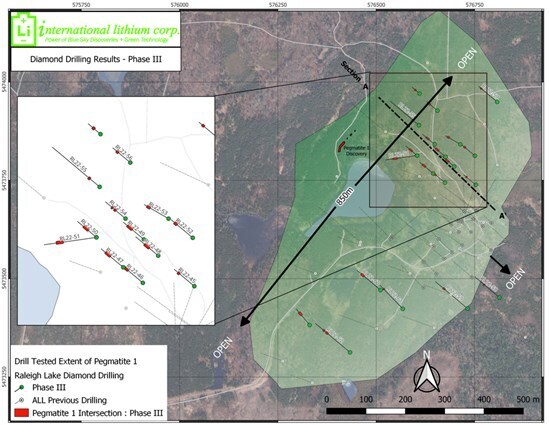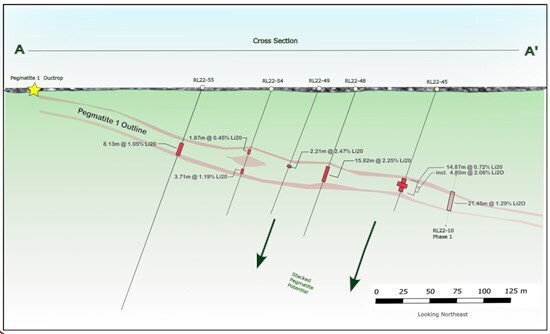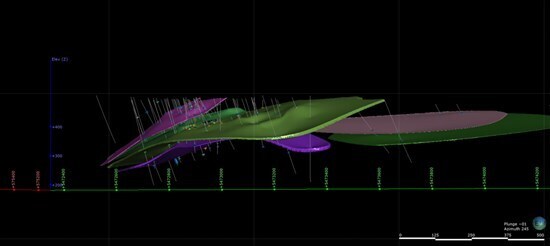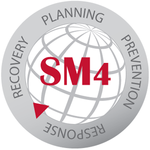Vancouver, British Columbia--(Newsfile Corp. - February 6, 2023) - International Lithium Corp. (TSXV: ILC) (OTCQB: ILHMF) (FSE: IAH) (the "Company" or "ILC") is pleased to announce assay results for Phase 3 of the diamond drilling program at Zone 1 of the Raleigh Lake Lithium project near Ignace, Ontario, Canada.
The Raleigh Lake project consists of 48,500 hectares (485 square kilometres) of adjoining mineral claims 100% owned by ILC. It is not subject to any encumbrances and is royalty free. It is located less than 20 kilometers directly west of the Township of Ignace, Ontario. It distinguishes itself from other lithium projects in Canada by being very well situated near to major public infrastructure; the Trans-Canada Highway, with direct access to Thunder Bay on Lake Superior, is less than six kilometers north of the project as is the mainline of the Canadian Pacific Railway, natural gas pipelines, and the hydro power line junction at Raleigh Lake
Drilling Highlights
- All Phase 3 holes testing Pegmatite 1 in Zone 1 intersected spodumene-bearing pegmatite, demonstrating tremendous continuity of the mineralized body (see Figure 1).
- Thicker and higher-grade mineralization intersected closer to surface as anticipated.
- Phase 1, 2 and 3 pierce points have intersected Pegmatite 1 along a strike length of over 800 metres and along its dip for over 400 metres.
- All results from Phase 3 are to be included in the upcoming mineral resource estimate.
Pegmatite 1 Spodumene Zone Intersection Highlights*
- RL22-45: 4.85 metres grading 2.06% Li2O in lower spodumene zone (from 89.5 metres);
- RL22-48: 15.82 metres grading 2.25% Li2O (from 65.56 metres);
- RL22-49: 2.21 metres grading 2.47% Li2O (from 72.69 metres);
- RL22-50: 4.62 metres grading 2.29% Li2O (from 56.12 metres);
- RL22-56: 2.96 metres grading 2.13% Li2O (from 72.42 metres);
Pegmatite 1 Rubidium Bearing Microcline Intersection Highlights*
- RL22-45: 3.98 metres grading 1.21% Rb2O from 85.52 metres;
- RL22-57: 4.69 metres grading 0.60% Rb2O from 152.51 metres.
* All intervals reported are downhole core lengths. Accurate true widths are unknown at this time but are estimated to be within 80-100% of the reported intervals based on the geometry of the bodies and structural measurements on oriented core.
Other Highlights for the Raleigh Lake Project
Airborne Geophysical Survey
The Company has completed a Mobile MTm electromagnetic and horizontal gradient magnetometer airborne geophysical survey, conducted by Expert Geophysics Limited based in Aurora, Ontario. The survey over the greater Raleigh Lake area consisted of 6308 line-kilometres and has provided detailed information on lithologies and structures in an area of approximately 540 square kilometres. The data are currently being prepared for detailed interpretive work ahead of the 2023 field exploration season.
Ontario Junior Exploration Program (OJEP) Funding Award
The Company had applied for funding under the OJEP initiative in 2022 and qualified for the maximum distribution amount for any single project of CAN $200,000. The first CAN $60,000 was received in late 2022 with the remaining CAN $140,000 expected in April 2023.
Regional Exploration Drilling
The Company drilled 398 metres in 8 holes targeting regional lithogeochemical targets developed from earlier exploration programs. Some thin veins were intersected in some of the holes and the Company is still waiting on analytical results for these drill holes. The goal will be to correlate the drill results with the surface anomalies and determine the potential for spodumene bearing pegmatite bodies to be present in the vicinity of the anomalous lithogeochemical target areas.
2022 Drilling Campaign at Raleigh Lake
Further to Company news releases dated February 9, March 21, May 17, June 23, and September 20, 2022; ILC completed 9894 metres core drilling at the Raleigh Lake project in three phases during 2022 (Table 1). Phase 1 ran during the winter months of March and April 2022 where nine (9) holes were drilled for a total of 1,973 metres. Phase 2 ran from May 12 to June 30, 2022 drilling 4,198 metres in twenty-six (26) holes. Phase 3 ran from September 27 to November 9 drilling twenty (20) holes for 3325 metres on Zone 1 where the calculation of maiden mineral resource estimate is underway, and from November 10 to 30, 2022 with eight (8) holes (398 metres) on peripheral exploration targets. All drill holes at Zone 1 intersected spodumene bearing pegmatite.
Table 1: Summary of drilling during the three Phases of the 2022 drill program at Raleigh Lake.
| 2022 Drilling | Start Date | End Date | No. of Holes | Total Meterage |
| Phase 1 | March 12 | April 15 | 9 | 1973 |
| Phase 2 | May 9 | July 5 | 26 | 4198 |
| Phase 3 | September 27 | November 9 | 20 | 3325 |
| Regional Exploration | November 10 | November 30 | 8 | 398 |
| Total | 63 | 9894 |
Phase 3 Drilling
Twenty of the twenty-eight holes drilled during Phase 3 of the 2022 drilling campaign were cored in Zone 1 and continued to test the up-dip and eastern extent of Pegmatites 1 and 3 while also providing peripheral and infill drilling to help refine the maiden resource estimate, currently underway (Figure 1 and 2). Zone 1 is a stacked set of shallow dipping pegmatite dykes that make up the main resource target area at the Raleigh Lake project (Figure 3).
Zone 1 pegmatites have been defined by drilling and surface exposures in an area exceeding 800 metres x 400 metres for Pegmatite 1. The Phase 2 and 3 drill holes were drilled interstitially to historic drill holes and the Company's previous drilling (Figure 1). Pierce points were planned to be at approximately 50 metre step outs from one another where possible in preparation for a maiden resource calculation with a better-defined core zone of Pegmatite 1 and its associated rubidium rich component.
The high-grade core of Pegmatite 1 is trending up-dip towards its surface exposure (Figure 2). The stacked pegmatites of Zone 1 appear to be converging down dip, plunging to the south below drill hole RL21-04.
The eastern extents of the Zone 1 pegmatites are known to terminate at the contact with the Raleigh Lake pluton located approximately 100 metres east of RL22-57, which intersected 4.69 metres grading 0.60% Rb2O from 152.51 metres downhole (Table 3). Therefore, the Company believes there is considerable room to grow the deposit in this direction.
The main Zone 1 pegmatites appear to thin trending along strike to the southwest along a major structural conduit. This potential control on pegmatite emplacement, that continues for several kilometres toward the Two Mica Granite, has not been tested further along strike. The Company believes that significant potential exists along this structural trend for additional pegmatites to be discovered.
Modelling of the stacked pegmatites at Zone 1 for the purpose of calculating a mineral resource estimate has confirmed that the Zone 2 pegmatites, which dip consistently to the southeast, project below Pegmatites 1 and 3 at Zone 1. The potential of these spodumene-bearing dykes to host mineralization that can be added to the maiden resource will be investigated in future drill programs.
A summary of the analytical results for Phase 3 is given in Table 3.
Table 2: Summary of drill holes cored during Phase 3 of the 2022 drill program at Raleigh Lake.
| Hole ID | Easting | Northing | Azimuth | Dip | Depth (m) | Elevation (m) | Prospect |
| RL22-45 | 576753 | 5473739 | 310 | -70 | 116 | 478 | ZONE 1 |
| RL22-46 | 576675 | 5473744 | 310 | -70 | 122 | 477 | ZONE 1 |
| RL22-47 | 576645 | 5473767 | 310 | -70 | 128 | 476 | ZONE 1 |
| RL22-48 | 576698 | 5473785 | 310 | -71 | 137 | 478 | ZONE 1 |
| RL22-49 | 576676 | 5473810 | 310 | -70 | 119 | 478 | ZONE 1 |
| RL22-50 | 576604 | 5473813 | 310 | -70 | 110 | 480 | ZONE 1 |
| RL22-51 | 576604 | 5473813 | 262 | -50 | 125 | 481 | ZONE 1 |
| RL22-52 | 576751 | 5473812 | 310 | -70 | 125 | 478 | ZONE 1 |
| RL22-53 | 576714 | 5473842 | 300 | -70 | 125 | 478 | ZONE 1 |
| RL22-54 | 576648 | 5473842 | 310 | -70 | 116 | 477 | ZONE 1 |
| RL22-55 | 576609 | 5473890 | 310 | -70 | 275 | 478 | ZONE 1 |
| RL22-56 | 576656 | 5473927 | 310 | -70 | 101 | 479 | ZONE 1 |
| RL22-57 | 576807 | 5473949 | 310 | -70 | 179 | 488 | ZONE 1 |
| RL22-58 | 576813 | 5473452 | 310 | -75 | 314 | 484 | ZONE 1 |
| RL22-59 | 576732 | 5473424 | 310 | -70 | 311 | 484 | ZONE 1 |
| RL22-60 | 576511 | 5473471 | 310 | -70 | 227 | 479 | ZONE 1 |
| RL22-61 | 576568 | 5473423 | 316 | -70 | 242 | 475 | ZONE 1 |
| RL22-62 | 576433 | 5473312 | 310 | 60 | 230 | 475 | ZONE 1 |
| RL22-63 | 576331 | 5473382 | 320 | -70 | 152 | 480 | ZONE 1 |
| RL22-64 | 576610 | 5473971 | 310 | -70 | 71 | 481 | ZONE 1 |
Table 3: Summary of significant mineralized intersections from Phase 3 Drilling at Raleigh Lake.
| 2022 Raleigh Lake Drilling Program : PHASE III | |||||||
| Pegmatite Intersections** | |||||||
| Hole_ID | From (m) | To (m) | Width (m) | Cs2O (%) | Li2O (%) | Rb2O (%) | Comments |
| RL22-45 | 84.2 | 99.07 | 14.87 | 0.02 | 0.72 | 0.43 | Pegmatite #1 top to bottom |
| incl. | 89.5 | 94.35 | 4.85 | 0.02 | 2.06 | 0.25 | Lower spodumene pegmatite |
| And | 85.52 | 89.5 | 3.98 | 1.21 | Upper Rb Zone | ||
| RL22-46 | 88.85 | 99.11 | 10.26 | 0.01 | 0.76 | 0.23 | Pegmatite #1 top to bottom |
| incl. | 88.85 | 94.67 | 5.82 | 0.02 | 1.32 | 0.34 | Upper spodumene zone |
| RL22-47 | 76.51 | 80.38 | 3.87 | 0.01 | 1.24 | 0.21 | Upper lens of Pegmatite 1 |
| And | 92.1 | 97.36 | 5.26 | 0.01 | 1.03 | 0.13 | Lower lens of Pegmatite 1 |
| RL22-48 | 65.56 | 81.38 | 15.82 | 0.01 | 2.25 | 0.12 | Pegmatite #1 top to bottom |
| incl. | 68.7 | 80.65 | 11.95 | 0.01 | 2.86 | 0.13 | Inner spodumene zone |
| RL22-49 | 72.69 | 74.9 | 2.21 | 0.02 | 2.47 | 0.22 | Pegmatite #1 interior spd zone |
| RL22-50 | 56.12 | 60.74 | 4.62 | 0.02 | 2.29 | 0.27 | Pegmatite #1 interior spd zone |
| RL22-51 | 86.48 | 91.68 | 5.2 | 0.02 | 1.24 | 0.23 | Pegmatite #1 interior spd zone |
| RL22-52 | 95.58 | 103.89 | 8.31 | 0.01 | 1.18 | 0.15 | Pegmatite #1 top to bottom |
| RL22-53 | 96.65 | 106.53 | 9.9 | 0.02 | 0.68 | 0.18 | Pegmatite #1 top to bottom. |
| RL22-54 | 76.49 | 80.2 | 3.71 | 0.02 | 1.19 | 0.25 | Pegmatite #1 top to bottom |
| RL22-55 | 55.26 | 63.39 | 8.13 | 0.02 | 1.05 | 0.27 | Pegmatite #1 top to bottom |
| RL22-56 | 72.42 | 75.38 | 2.96 | 0.03 | 2.13 | 0.39 | Inner spodumene zone |
| RL22-57 | 152.51 | 157.2 | 4.69 | 0.03 | 0.05 | 0.60 | Low spodumene, higher Rb |
| RL22-58 | 191.42 | 195.62 | 4.2 | 0.01 | 0.79 | 0.13 | |
| RL22-59 | 228.26 | 232.74 | 4.48 | 0.01 | 0.3 | 0.14 | Low grade pegmatite #1 |
| RL22-60 | 168.92 | 173.19 | 4.27 | 0.01 | 1.13 | 0.04 | Pegmatite #1 top to bottom |
| RL22-61 | 198.1 | 204.25 | 6.15 | 0.01 | 0.75 | 0.22 | Pegmatite #1 top to bottom |
| RL22-63 | 117 | 119.55 | 2.55 | 0.01 | 1.29 | 0.23 | Pegmatite #1 top to bottom |
| RL22-64 | 37.35 | 39.05 | 1.7 | 0.02 | 1.36 | 0.21 | Pegmatite #1 top to bottom |
** All intervals reported in this table are downhole core lengths. Accurate true widths are unknown at this time but are estimated to be within 80-100% of the reported intervals based on the geometry of the bodies and structural measurements on oriented core.

Figure 1: Approximate surface trace outline of Pegmatite 1 showing spodumene bearing pegmatite intersections from Phase 3 drilling. Only the outline for Pegmatite 1 is shown here and in Cross Section A-A' (Figure 2) for simplicity. The resource area actually consists of a series of stacked pegmatites numbered 1 to 6 (see Figure 3).
To view an enhanced version of this graphic, please visit:
https://images.newsfilecorp.com/files/3232/153746_e1d5181744a69909_003full.jpg

Figure 2: Cartoon cross section A-A' (Figure 1) illustrating the orientation of Pegmatite 1 and the up-dip projection to its surface outcrop as defined by Phase 3 drilling. Pegmatite 1 has now been defined in an area over 800 metres by 400 metres. Only Pegmatite 1 is shown on this section for clarity. The mineralization actually consists of a series of stacked spodumene bearing pegmatites as depicted in Figure 3.
To view an enhanced version of this graphic, please visit:
https://images.newsfilecorp.com/files/3232/153746_e1d5181744a69909_004full.jpg

Figure 3: Three-dimensional view of the modelled wireframes for Zone pegmatites in preparation for the resource calculation (looking west). Note the convergence of the stacked pegmatites to the south (left) and the pegmatites from Zone 2 projected underneath Zone 1 at the right.
To view an enhanced version of this graphic, please visit:
https://images.newsfilecorp.com/files/3232/153746_e1d5181744a69909_005full.jpg
Quality assurance/quality control procedures
International Lithium Corp. has implemented a rigorous quality assurance/quality control program to ensure best practices in sampling and analysis of diamond drill core. All assays are performed by Activation Laboratories Ltd. (ActLabs), with sample preparation and analysis carried out in their full-service facility in Dryden, Ontario. Sample preparation involves crushing the entire sample to 80% passing 2 mm, riffle split 250g and pulverize to 95% passing 105 µm (Code RX1).
Primary analysis method: Peroxide (Total) Fusion, ICP-OES & ICP-MS with 55 elements that include detection levels for Li of 15ppm - 50,000ppm and rubidium of 0.4 to 5,000 ppm (Lab code UT7). Sodium peroxide fusion provides total metal recovery and is effective for the decomposition of sulphides and refractory minerals which are common to pegmatite.
Over limit analysis method: Samples that return with results above the instruments detectable levels for lithium (50,000 ppm) and Rb (5,000 ppm) are then re-analyzed by Assay Grade, Peroxide (Total) Fusion (Code 8 Peroxide ICP-OES).
The drill program was under the control of a Professional Geoscientist, registered with Engineers & Geoscientists British Columbia. The Company and its contractors carried out the program under full compliance with COVID-19 protocols based on guidelines issued by Public Health Ontario and provincial health authorities of Ontario to ensure the safety and health, for all personnel.
About International Lithium Corp.
International Lithium Corp. believes that the world faces a significant turning point in the energy market's dependence on oil and gas and in the governmental and public view of climate change. In addition, we have seen the clear and increasingly urgent wish by the USA and Canada to safeguard their supplies of critical battery metals and to become more self-sufficient. Our Canadian projects are strategic in that respect.
Our key mission in the next decade is to make money for our shareholders from lithium and rare metals while at the same time helping to create a greener, cleaner planet. This includes optimizing the value of our existing projects in Canada and Ireland as well as finding, exploring and developing projects that have the potential to become world class lithium and rare metal deposits. We have announced separately that we regard Zimbabwe as an important strategic target market for ILC, and we hope to be able to make announcements over the next few weeks and months.
A key goal has been to become a well-funded company to turn our aspirations into reality, and following the disposal of the Mariana project in Argentina in 2021 and the Mavis Lake project in Canada in January 2022, the Board of the Company considers that ILC is now well placed in that respect with a strong net cash position.
The Company's interests in various projects now consists of the following, and in addition the Company continues to seek other opportunities:
| Name | Location | Area (Hectares) | Current Ownership Percentage | Future Ownership percentage if options exercised or work carried out | Operator or JV Partner |
| Raleigh Lake | Ontario | 48,500 | 100% | 100% | ILC |
| Wolf Ridge | Ontario | 5,700 | 0% | 100% | ILC |
| Avalonia | Ireland | 29,200 | 45% | 21% | Ganfeng Lithium |
| Mavis Lake | Ontario | 2,600 | 0% | 0% (carries an extra earn-in payment of CAD $1.4M if resource targets met) | Critical Resources Ltd (ASX:CRR) |
| Forgan Lake & Lucky Lake | Ontario | < 500 | 0% | 1.5% Net Smelter Royalty | Ultra Lithium Inc. (TSX.V:ULT) |
The Company's primary strategic focus at this point is on the Raleigh Lake lithium and rubidium project in Canada and on identifying additional properties in Canada and Zimbabwe.
The Raleigh Lake project consists of 48,500 hectares (485 square kilometres) of mineral claims in Ontario and is ILC's most significant project in Canada. The exploration results there so far, which are on only about 8% of ILC's current claims, have shown significant quantities of rubidium and caesium in the pegmatite as well as lithium. Raleigh Lake is 100% owned by ILC, is not subject to any encumbrances, and is royalty free.
With the increasing demand for high tech rechargeable batteries used in electric vehicles and electrical storage as well as portable electronics, lithium has been designated "the new oil", and is a key part of a "green tech" sustainable economy. By positioning itself with projects with significant resource potential and with solid strategic partners, ILC aims to be one of the lithium and rare metals resource developers of choice for investors and to continue to build value for its shareholders in the '20s, the decade of battery metals.
Patrick McLaughlin, P. Geo., a Qualified Person as defined by NI 43-101, has verified the disclosed technical information and has reviewed and approved the contents of this news release.
On behalf of the Company,
John Wisbey
Chairman and CEO
For further information concerning this news release please contact +1 604-449-6520
Neither TSX Venture Exchange nor its Regulation Services Provider (as that term is defined in the policies of the TSX Venture Exchange) accepts responsibility for the adequacy or accuracy of this release.
Cautionary Statement Regarding Forward-Looking Information
Except for statements of historical fact, this news release or other releases contain certain "forward-looking information" within the meaning of applicable securities law. Forward-looking information or forward-looking statements in this or other news releases may include: the effect of results of anticipated production rates, the timing and/or anticipated results of drilling on the Raleigh Lake or Wolf Ridge or Avalonia projects, the expectation of resource estimates, preliminary economic assessments, feasibility studies, lithium or rubidium or caesium recoveries, modeling of capital and operating costs, results of studies utilizing various technologies at the company's projects, budgeted expenditures and planned exploration work on the Company's projects, increased value of shareholder investments, and assumptions about ethical behaviour by our joint venture partners or third party operators of projects. Such forward-looking information is based on a number of assumptions and subject to a variety of risks and uncertainties, including but not limited to those discussed in the sections entitled "Risks" and "Forward-Looking Statements" in the interim and annual Management's Discussion and Analysis which are available at www.sedar.com. While management believes that the assumptions made are reasonable, there can be no assurance that forward-looking statements will prove to be accurate. Should one or more of the risks, uncertainties or other factors materialize, or should underlying assumptions prove incorrect, actual results may vary materially from those described in forward-looking information. Forward-looking information herein, and all subsequent written and oral forward-looking information are based on expectations, estimates and opinions of management on the dates they are made that, while considered reasonable by the Company as of the time of such statements, are subject to significant business, economic, legislative, and competitive uncertainties and contingencies. These estimates and assumptions may prove to be incorrect and are expressly qualified in their entirety by this cautionary statement. Except as required by law, the Company assumes no obligation to update forward-looking information should circumstances or management's estimates or opinions change.
To view the source version of this press release, please visit https://www.newsfilecorp.com/release/153746







